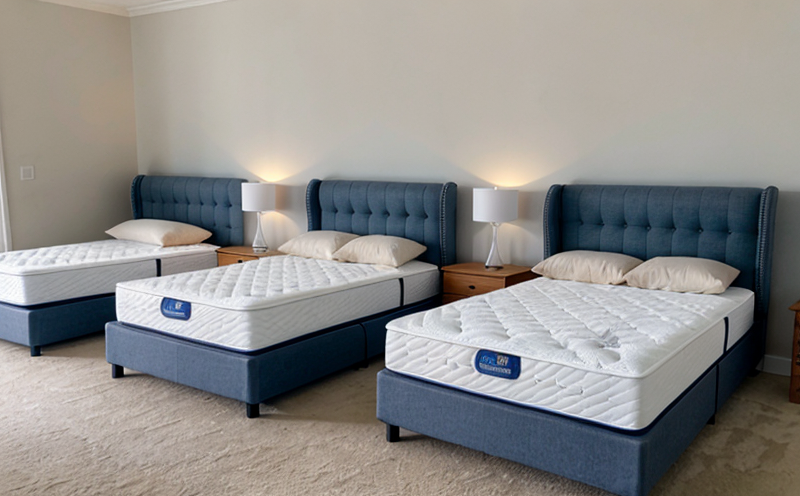ASTM F1566 Standard Test Methods for Mattresses Durability and Performance Testing
The ASTM F1566 standard is a comprehensive set of test methods designed to evaluate the durability and performance of mattresses. This standard is particularly relevant in sectors such as home furnishings, bedding manufacturers, and retail where the quality and longevity of mattresses are critical factors. The primary objective of these tests is to ensure that mattresses meet industry standards for comfort, support, and safety.
The ASTM F1566 standard encompasses a variety of tests including pressure distribution testing, static load deflection (SLD), indentation load deflection (ILD), and durability evaluations. These tests are crucial in assessing the performance characteristics of mattresses under both laboratory conditions and simulated real-world use scenarios. The standard provides clear guidelines on how to perform these tests accurately and consistently.
Pressure distribution testing helps in understanding how a mattress distributes body weight evenly, which is essential for comfort and pressure relief. Static load deflection (SLD) measures the amount of indentation a mattress makes under a given static load, providing insights into its support properties. Indentation load deflection (ILD), another key parameter, evaluates the firmness of the mattress by measuring how much it compresses when a specified force is applied.
Durability evaluations are critical for assessing the long-term performance and longevity of mattresses. These tests simulate typical use conditions to predict how well a mattress will hold up over time. Factors such as wear patterns, structural integrity, and resistance to deformation are carefully monitored during these durability assessments. The results from ASTM F1566 testing can significantly influence product design, material selection, and marketing strategies.
The standard also includes detailed instructions for specimen preparation, which involves selecting appropriate test samples that accurately represent the mattresses being evaluated. This ensures that the tests yield reliable and reproducible results. Proper specimen preparation is crucial as it directly impacts the validity of the test outcomes.
ASTM F1566 compliance is not only beneficial for manufacturers but also important from a consumer perspective. By adhering to this standard, mattress manufacturers can enhance their reputation by demonstrating a commitment to quality and safety. This can lead to increased customer satisfaction and loyalty as consumers are assured of the reliability and performance of the products they purchase.
The standard is aligned with international standards such as ISO 8923 and EN 16958, ensuring that it meets global best practices in mattress testing. Compliance with these standards can help mattress manufacturers meet regulatory requirements and enter new markets more easily.
Why It Matters
The ASTM F1566 standard is crucial for several reasons. Firstly, it ensures that mattresses are produced to a high standard of quality and performance, which directly impacts consumer satisfaction and health. Secondly, compliance with this standard can help manufacturers avoid legal issues related to product liability and safety. Lastly, it provides a framework for continuous improvement in mattress design and manufacturing processes.
From a business perspective, ASTM F1566 testing offers several advantages. It helps companies stay competitive by ensuring their products meet or exceed industry standards. This can lead to increased market share and customer trust. Additionally, the detailed data provided by these tests can be used for product development and marketing, enhancing brand reputation.
The standard also plays a vital role in consumer protection. By mandating rigorous testing procedures, it ensures that mattresses are safe, comfortable, and long-lasting. This protects consumers from potential hazards associated with poorly manufactured or unsafe products.
Benefits
Enhanced Product Quality: ASTM F1566 ensures consistent quality across all batches of mattresses produced by a manufacturer.
Increased Customer Satisfaction: By meeting this standard, manufacturers can provide products that meet or exceed customer expectations for comfort and durability.
Market Differentiation: Compliance with ASTM F1566 helps manufacturers stand out in the competitive bedding market by offering superior quality products.
Regulatory Compliance: Meeting this standard ensures compliance with relevant regulations, reducing the risk of legal issues and fines.
Risk Management: By identifying potential weaknesses early through rigorous testing, manufacturers can mitigate risks associated with product failure or injury.
Brand Reputation Enhancement: Consistently high-quality products backed by standards like ASTM F1566 contribute to a positive brand image and customer trust.
Premium Pricing Potential: Products that meet or exceed industry standards often command higher prices due to their perceived value and quality.





